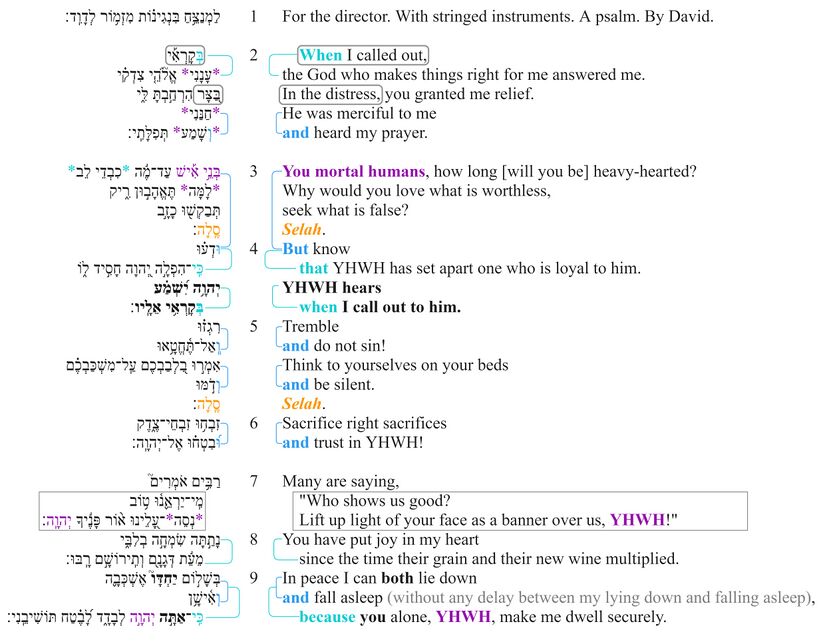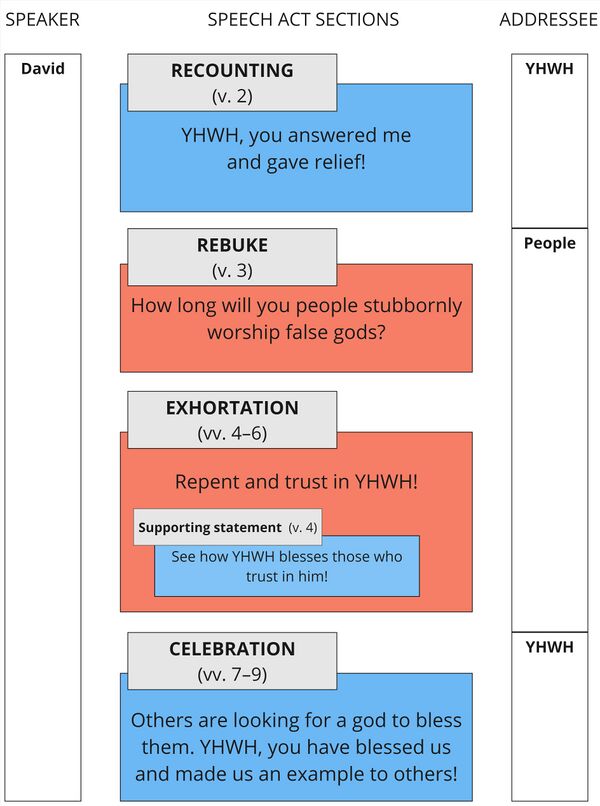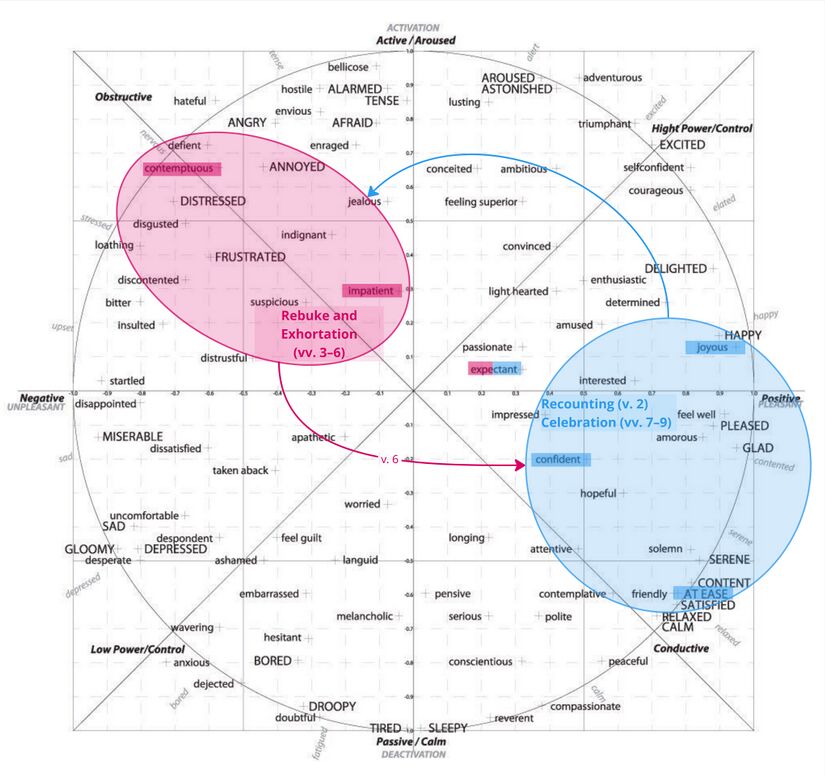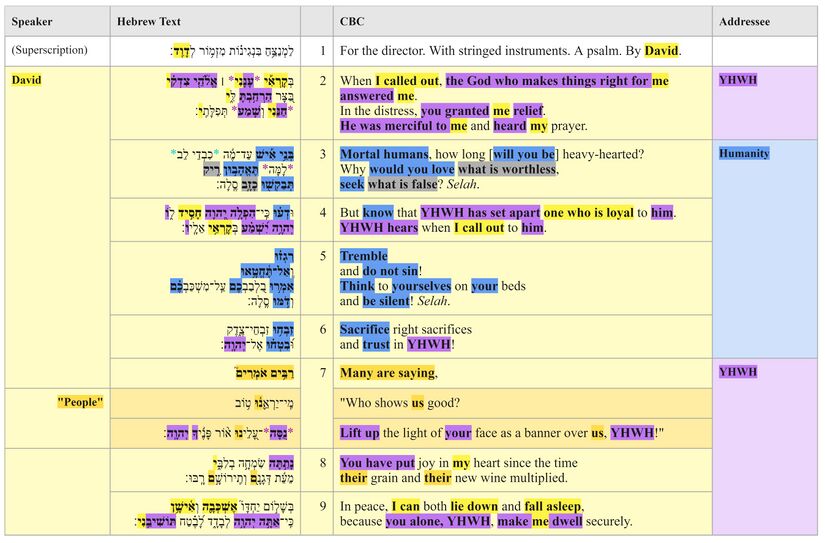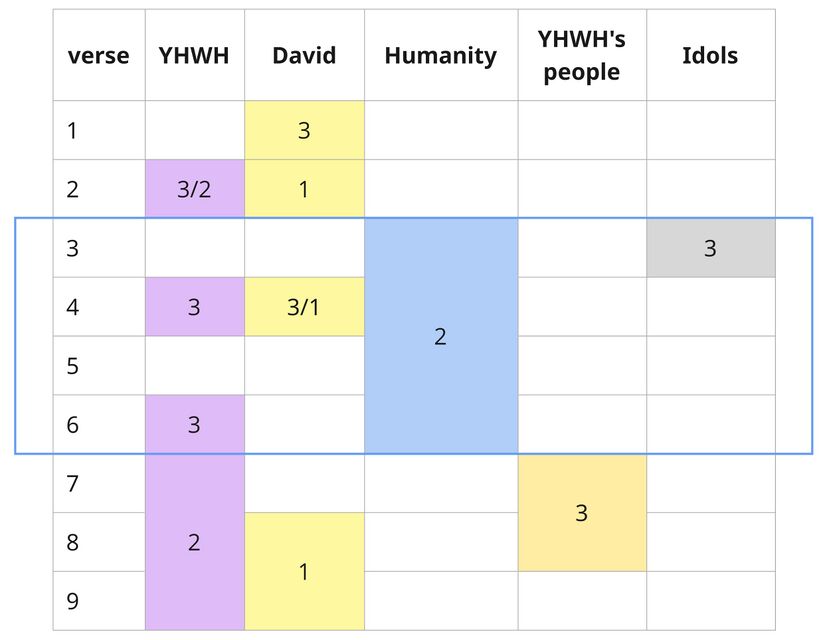Psalm 4 Discourse
About the Discourse Layer
Our Discourse layer includes four analyses: macrosyntax, speech act analysis, emotional analysis, and participant analysis. (For more information, click 'Expand' to the right.)
Macrosyntax
The macrosyntax layer rests on the belief that human communicators desire their addressees to receive a coherent picture of their message and will cooperatively provide clues to lead the addressee into a correct understanding. So, in the case of macrosyntax of the Psalms, the psalmist has explicitly left syntactic clues for the reader regarding the discourse structure of the entire psalm. Here we aim to account for the function of these elements, including the identification of conjunctions which either coordinate or subordinate entire clauses (as the analysis of coordinated individual phrases is carried out at the phrase-level semantics layer), vocatives, other discourse markers, direct speech, and clausal word order.
For a detailed explanation of our method, see the Macrosyntax Creator Guidelines.
Speech Act Analysis
The Speech Act layer presents the text in terms of what it does, following the findings of Speech Act Theory. It builds on the recognition that there is more to communication than the exchange of propositions. Speech act analysis is particularly important when communicating cross-culturally, and lack of understanding can lead to serious misunderstandings, since the ways languages and cultures perform speech acts varies widely.
For a detailed explanation of our method, see the Speech Act Analysis Creator Guidelines.
Emotional Analysis
This layer explores the emotional dimension of the biblical text and seeks to uncover the clues within the text itself that are part of the communicative intent of its author. The goal of this analysis is to chart the basic emotional tone and/or progression of the psalm.
For a detailed explanation of our method, see the Emotional Analysis Creator Guidelines.
Participant Analysis
Participant Analysis focuses on the characters in the psalm and asks, “Who are the main participants (or characters) in this psalm, and what are they saying or doing? It is often helpful for understanding literary structure, speaker identification, etc.
For a detailed explanation of our method, see the Participant Analysis Creator Guidelines.
Discourse Visuals for Psalm 4
Macrosyntax
Notes
Discourse Discontinuities
- v. 2 / vv. 3–6. The vocative in v. 3a introduces a new unit.
- vv. 3–6 / vv. 7–9. Beginning in v. 7, the psalmist turns again to speak to YHWH (see vocatives in vv. 7, 9; cf. v. 2b).
Constituent Order
- v. 2a - Clause- and line-initial בְּקָרְאִי is a frame setter.
- v. 2b - Likewise, בַּצָּר is a frame setter, parallel to בְּקָרְאִי in the previous line/clause. These first two lines (v. 2ab) have an abab structure.
- v. 4b - יְהוָה is fronted to indicate a thetic sentence, with both YHWH and בְּקָרְאִ֥י אֵלָֽיו activated and accessible from the previous discourse.
- v. 8b - The fronting of דְּגָנָם וְתִירוֹשָׁם is poetically motivated; it allows the verb רָבּוּ to conclude the line and form an inclusio with רַבִּים in v. 7a (see Poetic Structure).
- v. 9 - The word order in v. 9 is a-typical in a number of ways.
- The phrase בְּשָׁלוֹם is fronted, probably to create a poetic correspondence with בְּקָרְאִי at the beginning of v. 2 (see Poetic Structure).
- The adverbial יַחְדָּו is pre-verbal (contrast, e.g., Isa 46:2; Ps 35:26), perhaps for marked focus: I will both lie down and fall asleep, i.e., these two actions will happen simultaneously: I will fall asleep as soon as I lie down.
- The pronoun "you" (אַתָּה) is fronted for exclusive focus: "you (and you alone)." The adjectival phrase "alone" (לְבָדָד) further clarifies the exclusivity of YHWH's agency.
- The adverbial phrase לָבֶטַח is fronted, perhaps to correspond to the word order in v. 6b or perhaps to allow the verb תּוֹשִׁיבֵנִי to occur at the end of the clause/line/poem. Delaying the verb תּוֹשִׁיבֵנִי until the last word of this long clause creates tension that resolves with a strong sense of closure once the verb is finally read/heard.[1] As the last word of v. 9, תּוֹשִׁיבֵנִי also forms an inclusio with the first word of the verse, בְּשָׁלוֹם (notice the similar sounds b + sh), thus strengthening the sense of closure.
Vocatives
- v. 3 - The vocative "mortal humans" is clause-initial to identify the addressee.[2]
- v. 7 - The vocative "YHWH" is clause-final, perhaps by default, or by attraction to the 2ms suffix on פָּנֶיךָ.
- v. 9 - The vocative "YHWH" is after the subject "you" (אַתָּה) since the latter is in marked focus.[3]
Discourse Markers
- vv. 3, 5 - Selah (vv. 3, 5) does not indicate strong discourse boundaries in this psalm, as it does, for example, in the previous psalm (Ps 3). It does, however subdivide the second main section of the psalm, the address to mortal humans, into three parts (see Poetic Structure).
Speech Act Analysis
Summary Visual
Speech Act Chart
Emotional Analysis
Summary visual
Emotional Analysis Chart
Emotional Circumplex
Participant analysis
There are 5 participants/characters in Psalm 4:

- David is the king and representative of YHWH's people. Because he is YHWH's "loyal one" (v. 4), YHWH listens to him when he calls out (vv. 2, 4) and blesses him (vv. 2, 7–9).
- YHWH is "the God who makes things right" for David (v. 2). He has set apart his people and his king for special treatment (v. 4), and so the light of his face is like a banner over them (v. 7), signaling to all people what true blessing looks like and inviting them to participate (cf. vv. 3–6).
- YHWH's people are those who are loyal to him (v. 4) and thus experience his favor and blessing—"the light of his face" manifested in an abundance of grain and new wine (vv. 7–8).
- About half of the psalm is addressed to humanity, referred to as "mortal humans" or "human beings" (v. 3). These are people (whether Israelites or non-Israelites) who seek blessing from gods other than YHWH (vv. 3, 7). David summons them to repent and trust in YHWH for true blessing.
- Lurking in the background of this psalm are idols, or gods that people worship other than YHWH. The psalmist derisively calls these idols "what is vain" and "what is false" (see notes on lexical semantics).
Participant Relations Diagram
The relationships among the participants may be abstracted and summarized as follows:
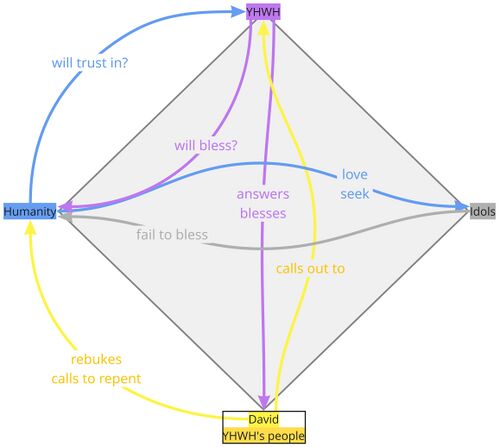

Participant Analysis Table
Notes
- v. 3: It is possible that YHWH is the speaker of v. 3. The vocative "mortal humans" or "human beings" (בְּנֵי אִישׁ) might imply a divine speaker.
- v. 4: The phrase "one who is loyal to him" refers primarily to David, the king (cf. the "I" in the parallel line), and, through him, to all of YHWH's people—everyone who rejects idolatry (v. 3) and is loyal to him. (The rest of the psalm makes clear that YHWH's people [and not David only] are set apart for special treatment [see vv. 7–8]).
- vv. 7–8: There are multiple participant-related ambiguities in vv. 7–8.
- Who are the "many" in v. 7a? It is possible that the "many" are to be identified with the "mortal humans" addressed in vv. 3–6. The speech of the "many" in v. 7a—"who will show us something good?"—would be entirely consistent with the attitude of the "mortal humans" described in v. 3. As Wilson writes, "This question reveals a rather crass pragmatism that led at the beginning of this psalm [see v. 3] to the callous disregard of covenant obligations and the pursuit of false hopes among the fertility deities."[4] But v. 7b—"the light of your face is made a banner over us, YHWH" or "lift up the light of your face on us, YHWH"—implies trust in YHWH. If v. 7b is part of the speech, then the "many" should be identified with people who trust in YHWH. Thus, the identification of the "many" largely depends on the extent of the speech. If, as we argue, the speech continues through the end of v. 7, then the "many" refer to YHWH's people and the question in v. 7a is rhetorical. It could either express an intense desire for good, a wish,[5] or it could be a liturgical question to which v. 7b gives the response: "Who shows us good? (YHWH does!) The light of your face, YHWH..." (cf. Ps 24:8, 10).
- Who is speaking in v. 7b? Verse 7b is either the psalmist’s own words in response to the "many" (e.g., NIV, NET, CEV, JPS85, NJB, NLT, LUT, NGÜ, TOB, BDS, S21, RVR95, NVI, DHH94I),[6] or a continuation of the speech of the "many" begun in v. 7a (e.g., NRSV, REB, ESV, GNT, HFA, GNB, PDV2017, NFC). The parallelism suggests that v. 7a and v. 7b come from the same speaker. As Goldingay writes, "Both cola refer to ‘we’ and it is natural with NRSV to read the whole verse as referring to the same ‘we’; it is the transition to verse 8 that marks the transition from ‘we’ to ‘I’. Hypothesising a transition to the suppliant’s words within verse 7 works against the poetry."[7] Furthermore, when direct speech is introduced and begun in the a-line of a couplet, it usually continues into the b-line (e.g., Pss 2:7; 10:6, 11; 12:5; 16:2; 38:17; 39:2; 40:8; 41:5; 42:10; 50:16; 53:2?; 55:7; 58:12; 66:3; 68:23; 71:11; 73:11; 77:11; 82:6; 83:5, 13; 87:5; 89:3; 91:2; 94:7; 102:25; 105:11; 139:11; 140:7?; exceptions: Pss 13:5; 14:1?; 27:8; 31:23; 35:10?; 74:8; 79:10; 94:18; 96:10?).
- Whose grain and new wine multiplied (v. 8b)? The suffix "their" in v. 8b naturally refers to YHWH's people, the "many" described in v. 7.
Participant Distribution Table
Bibliography
- Baethgen, Friedrich. 1904. Die Psalmen. Göttingen: Vandenhoeck und Ruprecht.
- Briggs, Charles A., and Emilie Briggs. 1906. A Critical and Exegetical Commentary on the Book of Psalms. Vol. 1. ICC. Edinburgh: T & T Clark.
- Goldingay, John. 2006. “Psalm 4: Ambiguity and Resolution.” Tyndale Bulletin 57 (2): 161–72.
- Kim, Young Bok. 2023. Hebrew Forms of Address: A Sociolinguistic Analysis. Atlanta: SBL Press.
- Miller, Cynthia L. 2010. “Vocative Syntax in Biblical Hebrew Prose and Poetry: A Preliminary Analysis.” Semitic Studies 55 (1): 347–64.
- Wilson, Gerald H. 2002. Psalms. Vol. 1. NIVAC. Grand Rapids: Zondervan.
